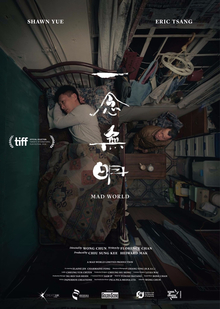
This is one of the higher profile Hong Kong films of recent years and the only wonder of it is that I took so long to get around to it. This is especially cogent for us as the film deals with bipolar disorder with which we are both familiar. As is so often the case nowadays, it was directed by a young and virtually unknown newcomer Wong Chun and immediately racked up a whole slew of awards.
Sai Tung is discharged from a mental hospital into the care of his reluctant father, Dai Hoi. The latter works as a truck driver and lives in a tiny flat that consists of only a single room, which makes things difficult for both of them. As Sai Tung tries to put his life back together, flashbacks reveal that he once had a career as a finance executive but resigned in order to take care of his ailing mother who also seemed to have mental problems. Both his father and his elder brother were absent all this time, with the former earning money in China to send back to them and the latter having made a new life for himself in the United States. In the present Sai Tung tries to reconnect with his friends and former fiancée but finds doors closed to him at every turn. His father meanwhile struggles with the dilemma of whether to send him back to the hospital when he relapses.
As promised, this is indeed one of the stronger films to have emerged out of Hong Kong recently and presents a more realistic view of mental illness than the norm. In particular it refrains from cloying sentimentality and acknowledges that there are no neat solutions when a loved one becomes mentally ill. Unfortunately it is still flawed in numerous small ways and in the end returns to the traditional Asian dictum that it’s wrong to outsource care of family members to others. The film also pours on the misery by adding additional but unrelated complications to the lives of the main characters, such as Dai Hoi being involved in a minor accident and Sai Tung’s friend being distressed due to turmoil in the financial markets. It’s a standard technique to add even more trauma to the already sad lives of these characters but they’re only distractions that detract from the insights that can be gleaned from the main dilemma.
To my mind, this is the powerful struggle that a relative feels when a person in the family is mentally ill and the love and hate relationship that arises from needing to care for such a person. The film also offers the insight that mental illness often runs in the family. The prolonged effort and stress of needing to care for a suffering relative can easily be the trigger that leads the carer himself or herself becoming sick. I like that this is one of the rare films covering bipolar disorder that bothers to depict the patient in a manic, high state. As this film itself shows, this state is too frequently regarded by observers as something positive rather than alarming as high energy, being talkative and confidence are seen as good things. Unfortunately even this film glosses over this phase too quickly and chooses to focus on the depressive, down phase of the sufferer. As my wife states. directors simply find this easier to film and to earn the audience’s sympathy with.
At least the film is honest enough to acknowledge that there are no simple solutions and there is no recourse other than a lifetime of ongoing effort and attention. However it is still frustrating that the film appears to blame family members who are unable to rise to the occasion to provide this level of support. It remains rare in Asian cinema to blame the government or society as a whole for forcing individuals who themselves lead precarious lives to do the impossible instead building the requisite support networks. On the whole, this is solid work but the director’s lack of maturity and reliance on traditional scenes like dramatic confessions remain evident. It’s good and praiseworthy but it’s still a sad indictment that this is the best that Hong Kong cinema can achieve right now.